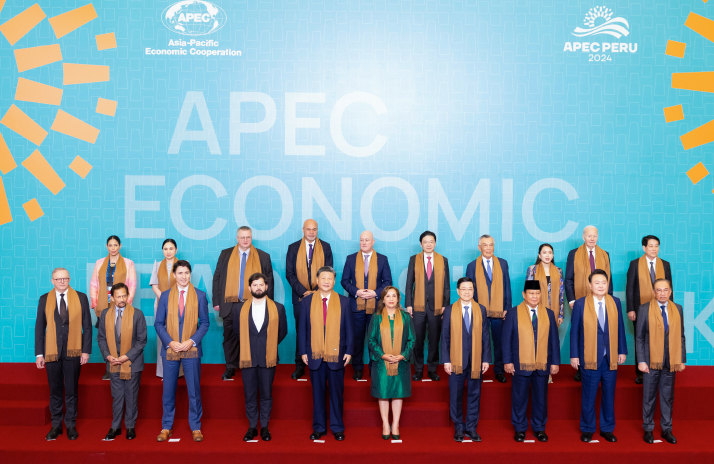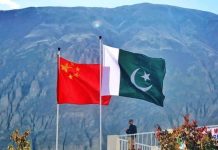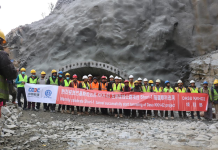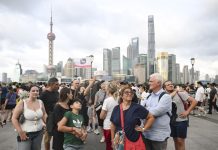
In a dynamic display of international diplomacy and economic strategy, the 31st Asia-Pacific Economic Cooperation (APEC) Economic Leaders’ Meeting convened in Lima, Peru, on November 16, while the vibrant city of Rio de Janeiro, Brazil, played host to the 19th Group of 20 (G20) Summit days later on November 18-19.
As world leaders gathered in these two bustling Latin American metropolises, the focus was on fostering sustainable growth, navigating global challenges and strengthening cooperative ties amid an ever-evolving geopolitical landscape. The outcomes of these meetings promise to shape the future trajectory of global economic policies and partnerships.
On November 13, Chinese President Xi Jinping embarked on his sixth trip to Latin America as the president of China to attend both meetings and for state visits to Peru and Brazil.
Amid sluggish global economic growth and new challenges facing Asia-Pacific regional economic cooperation, countries in the region should collaborate more closely and efficiently, Jiang Shixue, Director of the Center for Latin American Studies at Shanghai University, told Beijing Review. “With trade protectionism on the rise, the role of APEC as an international multilateral organization focused on economic cooperation in promoting trade dialogue and facilitating cooperation is more important than ever.”
Within the framework of the G20, China and other countries have consistently focused on development issues, trying to inject more momentum into common prosperity. However, “global governance requires the participation of each and every country,” Jiang added.
Inclusive cooperation
During their two-day summit, APEC members agreed to work toward an open, dynamic, resilient and peaceful Asia-Pacific community at a time of mounting challenges and uncertainties. “We acknowledge the importance of, and will continue to work to deliver, a free, open, fair, non-discriminatory, transparent, inclusive and predictable trade and investment environment,” the leaders of the 21-member APEC said in a joint statement.
The meeting issued three outcome documents: 2024 APEC Leaders’ Machu Picchu Declaration, Ichma Statement on a New Look at the Free Trade Area of the Asia-Pacific Agenda and Lima Roadmap to Promote the Transition to the Formal and Global Economies.
Founded in 1989, APEC is a product of economic globalization, trade and investment liberalization and regional economic integration. After 35 years, APEC, with 21 members and three observers, has become the highest-level, most extensive and most influential economic cooperation mechanism in the Asia-Pacific region, covering 38 percent of the global population, accounting for 47 percent of trade, and 61 percent of global GDP.
Xi announced on November 17 that China will host the 2026 APEC Economic Leaders’ Meeting, and is ready to work with all parties to deepen Asia-Pacific cooperation.
“APEC’s mechanism shows strong vitality because it always strives toward the common goal of enlarging the regional cooperation pie, respecting the differences in economic development levels and the pace of progress among its members,” Liu Chenyang, Director of the APEC Study Center at Nankai University, told China Youth Daily.
Through the efforts of its members, APEC has developed an approach of voluntarism, consensus-building, flexibility, pragmatism and incremental progress, which is both flexible and inclusive, Liu said, adding “such a mechanism allows APEC’s cooperation process to largely offset the interference of geopolitical factors, thus providing solutions to the prominent challenges facing the Asia-Pacific region.”

Xi urged APEC economies to “act in solidarity and cooperation to meet the challenges, fully deliver on the Putrajaya Vision 2040, build an Asia-Pacific community with a shared future and start a new era in Asia-Pacific development.” Adopted by APEC leaders in 2020, the Putrajaya Vision 2040 envisions “an open, dynamic, resilient and peaceful Asia-Pacific community by 2040, for the prosperity of all our people and future generations.”
In reality, this vision of shared prosperity and enduring stability faces growing challenges. For instance, Liu Ying, Director of the Cooperative Research Department of Chongyang Institute for Financial Studies at Renmin University of China, said that in the restructuring of global industrial and supply chains in the post-COVID period, it is essential to strengthen the multilateral trading system and resist the encroachment of unilateralism and protectionism.
“We should stay committed to multilateralism and an open economy, firmly uphold the multilateral trading system with the World Trade Organization at its core, fully reactivate APEC’s role as an incubator of global economic and trade rules and advance regional economic integration and connectivity,” Xi said.
APEC members should foster more regional integration efforts, starting with establishing joint commitments to enhancing free trade, decarbonization and investments, as “strong economic interdependency prevents conflict and tension,” Neo Letswalo, a researcher at the Department of Politics and International Relations at South Africa’s University of Johannesburg, told Xinhua News Agency.
Xi also emphasized the need to make green innovation a catalyst for the Asia-Pacific and called on APEC members to increase support for developing economies and disadvantaged groups, working together to grow the pie and distribute it equitably so that more economies and people benefit from development.

People show off dragon heads they made during the Spring Festival celebration in Recife, Brazil, on February 3 (XINHUA)
Common development
Compared to previous G20 summits, this year’s summit in Rio faced a more complex and challenging global situation, Xu Feibiao, Director of the Center for BRICS and G20 Studies of China Institutes of Contemporary International Relations, told Beijing Review.
From a political perspective, the summit is being held against the backdrop of two ongoing and escalating geopolitical conflicts: the Israel-Palestine conflict and the Russia-Ukraine conflict. Economically, the world is facing multiple challenges: Over 90 percent of economies are experiencing significant slowdowns, developing countries are dealing with worsening debt—with a peak in repayments expected next year—and financial and exchange rate issues are intensifying, Xu explained.
In terms of governance, with Donald Trump being reelected as the next president of the United States, global governance is inevitably affected. His “America First” agenda is expected to bring greater turmoil to the world, posing the greatest danger to the future of the G20, he warned.
As G20 leaders gathered to seek solutions to pressing global crises, ranging from hunger and economic instability to climate change, Xi urged that, as leaders of major countries, they should not let their vision be blocked by fleeting clouds. Rather, they must see the world as one community with a shared future, and shoulder their responsibility for history, take historical initiative, and move history forward.
Hunger is the biological expression of social ills, Brazilian President Luiz Inacio Lula da Silva said at the summit. “It is the product of political decisions that perpetuate the exclusion of a large part of humanity.”
According to the State of Food Security and Nutrition in the World report by the United Nations, 733 million people faced hunger in 2023.
On November 18, the G20 launched the Global Alliance against Hunger and Poverty to support the implementation of country-led, country-owned programs aiming at accelerating efforts to eradicate hunger and poverty while reducing inequalities and contributing to revitalizing global partnerships for sustainable development, according to the G20 Rio de Janeiro Leaders’ Declaration.
Addressing the summit, Xi outlined China’s eight actions to support global development, including pursuing high-quality Belt and Road cooperation, implementing the Global Development Initiative, supporting international cooperation on poverty reduction and food security, and supporting the G20 in carrying out practical cooperation for the benefit of the Global South (regions of the world generally characterized by lower levels of economic and industrial development and often located south of more industrialized nations—Ed.)
“It’s easy to say that poverty alleviation is the top priority, but it’s not easy to provide the work with resources in an effective and efficient way,” Sourabh Gupta, a senior fellow at the Washington-based Institute for China-America Studies, told Xinhua News Agency. “I think China has done that.”
Xi also called for improving global economic, financial, trade, digital and ecological governance to build a world economy characterized by cooperation, stability, openness, innovation and eco-friendliness.

Banners for the 19th G20 Summit in Rio de Janeiro, Brazil, on November 16 (XINHUA)
Taking a systemic view of global governance, Xi highlighted key actions in each of the main areas of global governance in his speech, Evandro Menezes de Carvalho, a professor of international law at Fluminense Federal University in Brazil and Director of the Center for Brazil-China Studies at the FGV Law School, said.
“China has already given concrete demonstrations of being a country committed to the development of a more inclusive international order. In addition, it has been very active in promoting green development with significant investment in technology and environmental conservation,” he said.
Global economic development depends on a balanced, stable financial and trade system that takes into account the needs of developing countries in order to promote a more inclusive international order, Carvalho said, highlighting the importance of Xi’s remarks on improving global digital and ecological governance with the Global South and developing countries involved.
The G20 comprises 19 countries across five continents, along with the European Union and the recently admitted African Union (AU). This year’s summit is the first gathering since the AU’s inclusion.
China was the main proponent advocating the AU’s full membership in the G20, Keith Bennett, an international relations consultant based in London, told Xinhua, noting that the move has strengthened the continent’s representation. “China is at the forefront of promoting the representation and voice of developing countries in the international governance system,” he added.
“For the progress of the G20, China is an important constructive force,” Xu said, adding that China not only has a clear stance—highly valuing and staunchly defending the status and role of the G20, practicing true multilateralism—but also takes concrete actions, such as being first to bring development issues into the G20 agenda and contributing feasible solutions to improve global governance.
The Rio G20 Summit adopted a leaders’ declaration, with the G20 leaders reaffirming their strong commitment to multilateralism and pledging to reform the global governance system.
The leaders pledged to work for a reinvigorated and strengthened multilateral system, rooted in the purposes and principles of the UN Charter and international law, with renewed institutions and a reformed system of global governance that is more representative and effective, according to the declaration.
They also pledged to reform the UN Security Council to align it with the realities and demands of the 21st century and make it more representative, inclusive and effective, the declaration said.
Increasing voice
In recent years, in particular, as developed countries like the U.S. increasingly focus on the Group of Seven (G7) over the G20—even treating the G20 as a field of competition for major countries, leading to the weakening of the G20—China’s positive stance becomes more
crucial, providing strong support for the G20 to move forward amid challenges, Xu said.
According to Liu Ying, Latin America is not only an important representative of developing countries and emerging economies, but its share in the global economy has also notably increased in recent years.

For example, Brazil and Argentina are gradually gaining an important position on the global economic arena through cooperation with major economies such as China and India. By participating in both APEC and the G20, Latin America not only holds an important position in the formulation of global economic policies but also plays an increasingly important role in promoting global trade liberalization and financial reforms, Liu added.
The APEC and G20 meetings offer these countries an opportunity to advocate for policies that reflect their interests and challenges, and to help build a more balanced, more representative and fairer global governance system where the voices of the Global South will also be heard, David Gosset, founder of the China-Europe-America Global Initiative, wrote in the newspaper China Daily.
Taking Brazil as an example. According to Liu Ying, the country has promoted several global economic cooperation initiatives in recent years, especially in the areas of climate change and sustainable development goals, fostering closer cooperation with other emerging economies such as members of the BRICS, a group of emerging economies originally consisting of Brazil, Russia, India, China and South Africa.
“Brazil’s voice in global financial and trade reforms is becoming more important, and its collaboration with other countries is bringing new strength to global governance,” she added.
It is foreseeable that in the future, the Global South, including China, will bring more opportunities to mechanisms such as the G20, steering it toward being more balanced and representative, Xu concluded. –The Daily Mail-Beijing Review news exchange item





